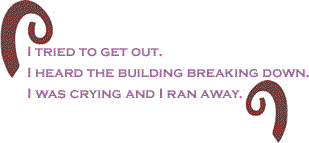
|
|||||||||||||||||||||||

|
|

Custom Search
|
|
 |
|
“No one cares
about the children, living or dead,” one furious father of children
in the collapsed school outside of Port au Prince Reports of the deaths caused by the collapse of the school on Friday continue to climb, reaching nearly 100 on Sunday. Several hundred other children escaped or were rescued. Many are still missing. “The families of the victims are mad,” the father said. “But it is not just the families who are mad. All the people know the government is not making good decisions. We do not trust that the government will help us. No doctors have come. Nobody comes except those who want to take pictures, make reports, and make money. We have been promised everything, but we have received nothing. Watch,” he said. “After fifteen days, no one is even going to be talking about this. Only the victims and the families will be talking about it. The government and some other people will get some money out of the disaster and the children and their families and the community will see none of it.” The three story school which collapsed, College La Promesse, has for years served hundreds of children from pre-school through high school, ages 3 to 20. The school operated on a hillside in Petionville, a suburb of Port au Prince.
“When I try to sleep,” said
the little girl, “I fear the house is going to fall on me and I
see the school falling again.” While Petionville is a prosperous suburb of Port au Prince, the school was in a poor neighborhood of the city called Nerrette. Though some news reports have indicated the school tuition was $1500 US a year, parents say that is absolutely wrong. “It was an inexpensive community school run by a community church,” one said. Reverend Fortin Augustin, founder and operator of the school, was being held and questioned by Haitian authorities over the weekend. Family members of Rev. Augustin said he voluntarily turned himself in Saturday after receiving numerous threats against himself and his family. Though the government is reportedly
considering charging Reverend Augustin with involuntary manslaughter,
relatives think he is being blamed for common construction problems
in One parent agreed. “I do not think it is the Reverend’s fault,” he said. “This is all about the government. They allow any type of construction anywhere. Many schools and other buildings in this country are built the same way. Why didn’t the Mayor stop the school construction if it was wrong? The Mayor campaigned in this very school and in the church. I accuse the government – the Mayor, the Ministers, even President Preval.”
When asked if the parents considered
going to court to seek justice from the government, the father scoffed.
“Justice in courts in The father saw hope in the Pere Jean-Juste admits the current
situation is grim but also sounds a note of hope. “We can provide
for the basic needs of the poor in BlackCommentator.com Columnist, Bill Quigley, is a human rights lawyer and law professor at Loyola University, New Orleans. He has been an active public interest lawyer since 1977 and has served as counsel with a wide range of public interest organizations on issues including Katrina social justice issues, public housing, voting rights, death penalty, living wage, civil liberties, educational reform, constitutional rights and civil disobedience. He has litigated numerous cases with the NAACP Legal Defense and Educational Fund, Inc., the Advancement Project, and with the ACLU of Louisiana, for which he served as General Counsel for over 15 yearsandl is one of the lawyers for displaced residents. Bill has visited Haiti many times as a volunteer advocate with the Institute for Justice and Peace in Haiti. Vladmir Laguerre, a journalist in Port au Prince, helped with this article. Click here to contact Mr. Quigley. |
|
Any BlackCommentator.com article may be re-printed so long as it is re-printed in its entirety and full credit given to the author and www.BlackCommentator.com. If the re-print is on the Internet we additionally request a link back to the original piece on our Website. Your comments are always welcome. eMail re-print notice
If you send us an eMail message we may publish all or part of it, unless you tell us it is not for publication. You may also request that we withhold your name. Thank you very much for your readership. |
|
| |
|
| Novmber 13, 2008 Issue 299 |
|
| Executive Editor: Bill Fletcher, Jr. |
| Managing Editor: Nancy Littlefield |
| Publisher: Peter Gamble |
| Est. April 5, 2002 |
Printer Friendly Version
in resizeable plain
text format or pdf
format. |
| Frequently Asked Questions |
 |

|
 |
 |
 |
| |
| |






























 One
eight year old girl, who attended the school for three years, reported
that her class had just returned from recess when they saw the ceiling
in their classroom falling down. She told this writer that she prayed
to God to save her and started running but could not see because
of all the dust and smoke in the air. “I tried to get out. I heard
the building breaking down. I was crying and I ran away. A man teacher
grabbed my hand and pulled me out of the school as the whole building
was falling. After I got outside, the teacher went back in. I cried
and cried because I could not find my brother and sister.” The little
girl eventually found her family and her brother and sister were
not seriously harmed.
One
eight year old girl, who attended the school for three years, reported
that her class had just returned from recess when they saw the ceiling
in their classroom falling down. She told this writer that she prayed
to God to save her and started running but could not see because
of all the dust and smoke in the air. “I tried to get out. I heard
the building breaking down. I was crying and I ran away. A man teacher
grabbed my hand and pulled me out of the school as the whole building
was falling. After I got outside, the teacher went back in. I cried
and cried because I could not find my brother and sister.” The little
girl eventually found her family and her brother and sister were
not seriously harmed.
 Reverend
Gerard Jean-Juste, a Haitian priest and longtime advocate for and
with the poor, was deeply saddened by the disaster. “The poorest
ones in
Reverend
Gerard Jean-Juste, a Haitian priest and longtime advocate for and
with the poor, was deeply saddened by the disaster. “The poorest
ones in 





